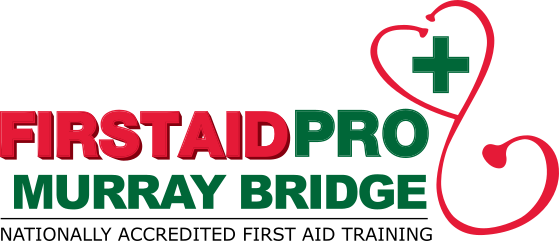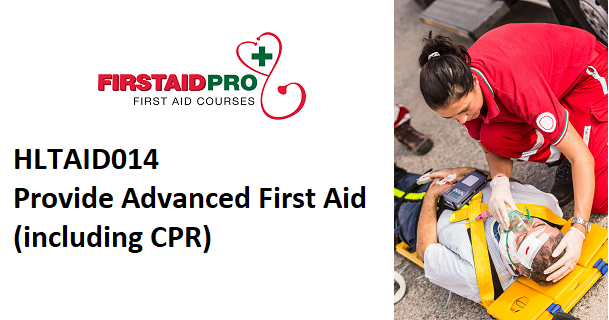Course Name
HLTAID014 – Provide Advanced First Aid Course
Course Code Included
HLTAID009 – Provide cardiopulmonary resuscitation
HLTAID010 – Provide basic emergency life support
HLTAID011 – Provide First Aid
HLTAID014 – Provide Advanced First Aid
Course Cost
$189 (may vary)
Course Duration
6 hrs Face to Face + Pre-reading and Quiz
Is the course accredited?
Yes
Does the course meet workplace requirements?
Yes
Alternate / Former Course Names
HLTAID006 Provide Advanced First Aid
Available Discounts
Group Booking Discounts Available
HLTAID014 - Provide Advanced First Aid
The newest Provide Advanced First Aid Course. Replaces superseded HLTAID006 Provide Advanced First Aid.
First Aid Pro Murray Bridge’s latest HLTAID014 Provide Advanced First Aid (including CPR) Face-to-Face course is the most advanced and interactive first aid course available.
With no online or out of class assessment requirements, students enrolled in the Provide Advanced First Aid course receive as much focused one-on-one trainer support as possible.
We are one of only a few registered training organisations (RTO: 40407) certified to offer HLTAID014 Provide Advanced First Aid in Murray Bridge.
Provide Advanced First Aid, as its title suggests, is the most wide-ranging and in-depth accredited and nationally recognised First Aid training course on offer.
All the key learnings and content of HLTAID009 Provide cardiopulmonary resuscitation and HLTAID011 Provide First Aid are covered in their totality PLUS several more specialist subjects.
All First Aid procedures taught are in line with the Australian Resuscitation Council (ARC), Safe Work Australia, Australian Society of Clinical Immunology and Allergy (ASCIA) and other national peak clinical body guidelines.
Despite its advanced title, this course is suitable for students of all backgrounds.
HLTAID006 is now HLTAID014
New Industry Standard
HLTAID014 Provide Advanced First Aid is the new industry standard for first aid training. It’s made up of these refreshed units of competency:
HLTAID009 Provide cardiopulmonary resuscitation (Old Course Code: HLTAID001)
HLTAID010 Provide basic emergency life support (Old Course Code: HLTAID002)
HLTAID011 Provide First Aid (Old Course Code: HLTAID003)
HLTAID014 Provide Advanced First Aid (Old Course Code: HLTAID006)
Trainer-Led First Aid Qualification
HLTAID014 Provide Advanced First Aid is completed in a single in-class session. There are no requirements for students to complete online or out of class assessments meaning students complete all knowledge and practical assessment requirements in the presence of a qualified and highly experienced first aid trainer who can provide guided assistance and one-on-one support not otherwise available in an online course.
Just a 6-hour in-class session
All knowledge and practical training and assessment for this course are completed in a single-day 6-hour session starting at 9:00 am and finishing at 4 pm and includes:
- Completion of a pre-course quiz on key content from the HLTAID014 Provide Advanced First Aid Learner Guide*
- An interactive, multimedia presentation on all required first aid topics (see knowledge evidence below)
- An independent multiple-choice knowledge assessment on first aid topics covered in the presentation
- Trainer marking and feedback on knowledge assessment
- A detailed and comprehensive trainer-led demonstration on how to use first aid equipment and perform all required first aid techniques and skills (see performance evidence below)
- Trainer led practice and question time on all required knowledge and performance evidence, including the use of first aid equipment
- Practical assessment of performance evidence in the form of role plays, observations, written and verbal incident/review reports and class debriefs
*To attend the in-class session, you must first complete your pre-course quiz. The number of study hours needed to complete this quiz varies depending on your existing knowledge, skills and experience.
First Aid Certificate Issue – Same Day
Successful completion of all the knowledge and performance evidence and criteria of HLTAID014 Provide Advanced First Aid course to a satisfactory level will result in the awarding of the following nationally recognised units of competency:
- HLTAID009 – Provide cardiopulmonary resuscitation
- HLTAID010 – Provide basic emergency life support
- HLTAID011 – Provide First Aid
- HLTAID014 – Provide Advanced First Aid
Australian Resuscitation Council (ARC) Guidelines recommend HLTAID011 Provide First Aid be updated every 3 years and HLTAID009 Provide cardiopulmonary resuscitation be updated every 12 months to remain valid.
Course cost
- $189 (may vary due to Daily Deals)
- Price match guarantee on any similar course
Is there an Advanced First Aid Course near me?
How long does Advanced First Aid Last?
Course times
- 9:00am – 4pm
Covid-19 Precautions
At First Aid Pro Murray Bridge, your health and safety is our priority. Infection control measures and Covid-19 practices are applied across all our training facilities, including but not limited to:
- Personal protective equipment (PPE)
- Social distancing, where possible
- Cleaning and sterilisation of equipment and materials
- Learner sign-in sheets
To help us keep you and your fellow learners safe, please do not attend a session if you are unwell, experiencing any symptoms or should be quarantining or self-isolating.
Where courses need to be rescheduled, First Aid Pro will notify learners at the earliest convenience.
Course requirements
In line with industry and organisational obligations, Adelaide First Aid Courses can only accept and issue nationally accredited units of competency to learners who are:
- At least 14 years of age (those who are under 18 must present a signed Parent or Guardian Consent Form)
Learners should also physically be capable of completing the performance requirements of this unit. At a minimum, learners will need to be able to:
- Perform at least 2 minutes of uninterrupted single rescuer cardiopulmonary resuscitation (CPR) (5 cycles of both compressions and ventilations) on an adult manikin placed on the floor
- Perform at least 2 minutes of uninterrupted single rescuer cardiopulmonary resuscitation (CPR) (5 cycles of both compressions and ventilations) on an infant resuscitation manikin placed on a firm surface
- Operate an automated external defibrillator (AED) to deliver at least one shock
- Provide first aid assistance for a number of conditions, including anaphylaxis, asthma, non-life-threatening, choking, envenomation, fractures, dislocations, sprains, strains, minor wounds, nosebleed, shock, life-threatening bleeding
USI requirements
A USI (unique student identifier) number is a mandatory requirement for any student wishing to undertake vocational training. A USI number is unique to you and provided by the government to keep a secure online record of your VET certifications. You can look up your number or register for a USI number quickly and easily by clicking on the following link: https://www.usi.gov.au/students/create-usi.
What do you learn in Advanced First Aid Training?
HLTAID014 Provide Advanced First Aid is a mix of knowledge (theory) and practical (skills).
If you complete the Face-to-Face course, you will be assessed on the knowledge requirements in class.
Practical assessment is completed in-class for both courses as you must be observed performing your first aid skills by a registered trainer.
Throughout this course, you will be assessed on:
Your understanding of:
(Knowledge/theory)
- Australian Resuscitation Council Guidelines
- Australian Society of Clinical Immunology and Allergy Action Plans
- Safe Work Australia Code of Practice
- Incident hazard and risk minimisation processes
- Infection control procedures
- Workplace or site first aid procedures
- First aid kit contents
- Education and Care Services National Law
- State Education and Care Services Regulations
- First aider Duty of Care requirements
- First aider requirements for currency of skill and knowledge
- First aider skill and knowledge limitations
- First aid parent/guardian consent
- First aid privacy and confidentiality requirements
- Stress management techniques and available support for rescuers and children
- The effect of positional change during CPR
- The appropriate duration, hand placement, compression/ventilation cycles and cessation of CPR
- Defibrillator – AED use on children
- Defibrillator – AED safety and maintenance procedures
- Chain of survival
- Accessing and handing over to emergency services
- Assessing the level of consciousness for infants and children
- Basic anatomical differences and first aid considerations between infants, children and adults
What does Advanced First Aid Cover?
- Taking and assessing vital signs, including normal clinical values (respiration, temperature, pulse, level of consciousness)
- Secondary assessments
- Basic triage processes
- First aid procedures for the aged, elderly or infirms
- First aid procedures for major and minor workplace accidents
- First aid procedures for children
- Use of ancillary first aid equipment and coordination of resources
- advanced first aid management for abdominal injuries
- allergic reaction
- anaphylaxis
- asthma
- non-life-threatening bleeding
- life-threatening bleeding
- for burns
- cardiac conditions, including chest pain
- advanced first aid management for childbirth
- choking
- crush injuries
- diabetes
- drowning
- ear injuries, including bleeding from the ear
- envenomation
- eye injuries
- fractures
- dislocations
- sprains
- strains
- head injuries
- neck injuries
- spinal injuries
- hypothermia
- hyperthermia
- minor wounds
- shock
- nosebleed
- poisoning
- seizures
- vomiting
- sharps injuries
- for stroke
- Substance misuse
- First aider and rescuer mental well-being and support (Mental Health)
Your ability to provide effective first aid to:
(Practical /skills)
- An unconscious, non-breathing adult and child (CPR, AED, 2 rescuer CPR)
- A regurgitating or vomiting unconscious adult and child (recovery position)
- An unconscious, non-breathing infant (CPR)
- An unconscious, breathing infant (open airway)
- A casualty with anaphylaxis (ASCIA Emergency Action Plan, Epipen)
- A casualty with asthma (ASCIA Emergency Action Plan, inhaler, spacer device)
- A casualty with non-life-threatening bleeding (bandage dressing)
- A casualty in shock (reassuring them, monitoring body temperature)
- A casualty who is choking (back blows, chest thrusts)
- A casualty who has been bitten by a snake (Pressure Immobilisation Technique)
- A casualty with a fractured arm (bandage, sling)
- A casualty with a dislocated shoulder (cold compress)
- A casualty with a sprained ankle (RICER)
- A casualty with a nosebleed (apply pressure, lean forward)
- A casualty with life-threatening bleeding (tourniquet, haemostatic dressing)
- A casualty with an unknown condition (Secondary assessment, DRSABCD)
- 2 casualties with simultaneous unknown conditions (Basic triage, coordination of resources, secondary assessment, DRSABCD)
You will also be assessed on your ability to:
- Identify when to provide first aid
- Follow DRSABCD protocol
- Complete incident reports
- Handover to emergency services
Why do I need Advanced First Aid?
The standard HLTAID011 Provide First Aid teaches the signs, symptoms and first aid management of most common conditions, but it does not address some of the more advanced, serious, time-sensitive and dangerous conditions. You do not ever want to be in a position where you cannot be of assistance because you only know how to assist in ‘common’ conditions. That’s why HLTAID014 Provide Advanced First Aid is such a great option.
New First Aid Codes
- HLTAID009 – Provide cardiopulmonary resuscitation
- HLTAID010 – Provide basic emergency life support
- HLTAID011 – Provide First Aid
- HLTAID012 – Provide First Aid in an education and care setting
- HLTAID013 – Provide First Aid in remote or isolated site
- HLTAID014 – Provide Advanced First Aid
- HLTAID015 – Provide advanced resuscitation and oxygen therapy
–
Previously known as
- HLTAID001 – Provide cardiopulmonary resuscitation
- HLTAID002 – Provide basic emergency life support
- HLTAID003 – Provide first aid
- HLTAID004 – Provide an emergency first aid response in an education & care setting
- HLTAID005 – Provide first aid in remote situations
- HLTAID006 – Provide Advanced First Aid
- HLTAID007 – Provide advanced resuscitation


